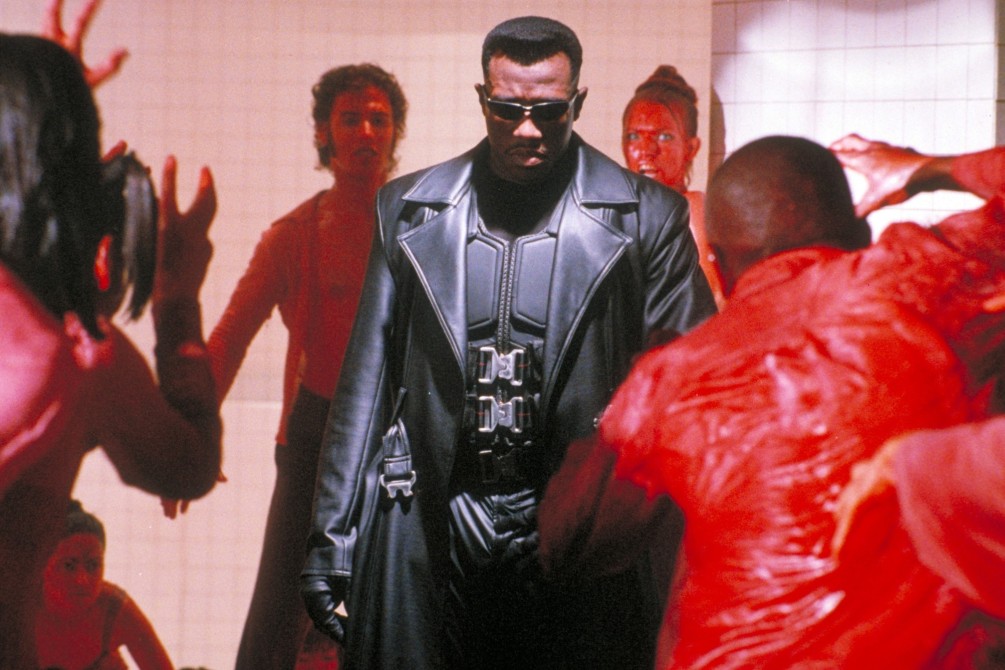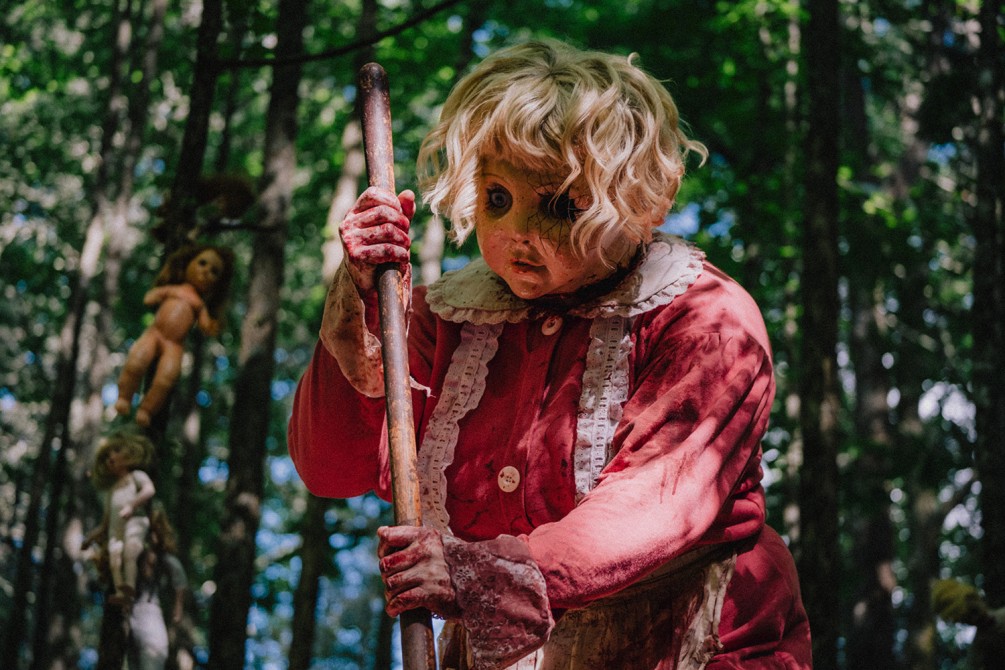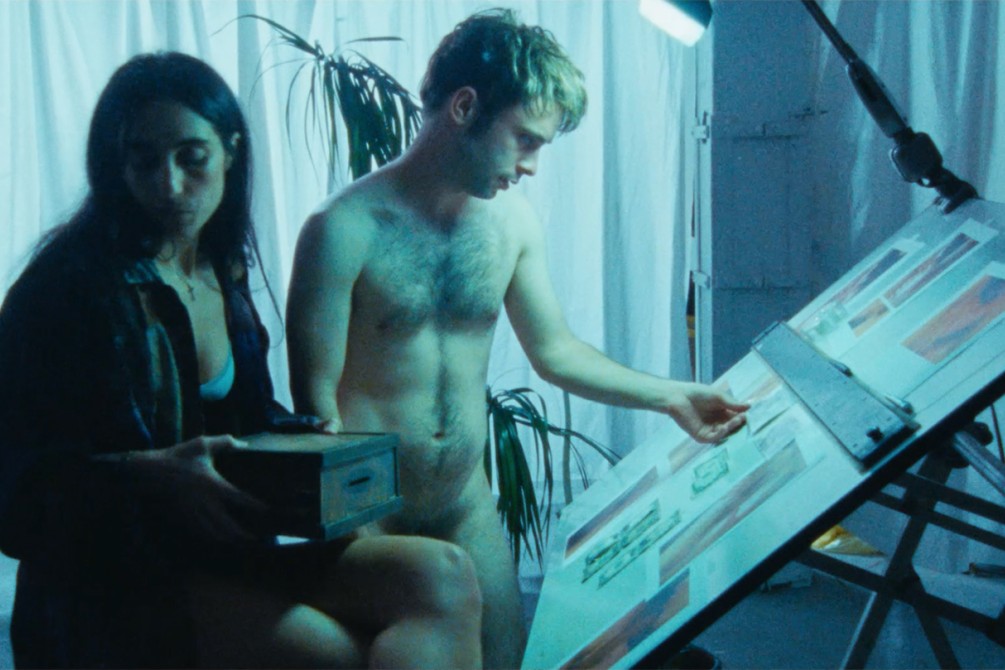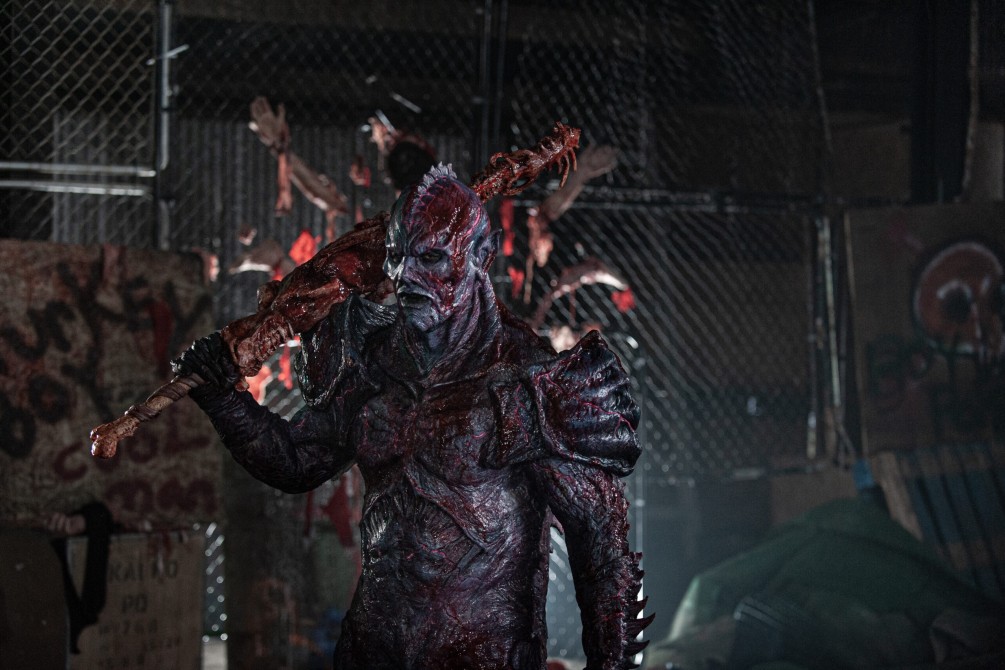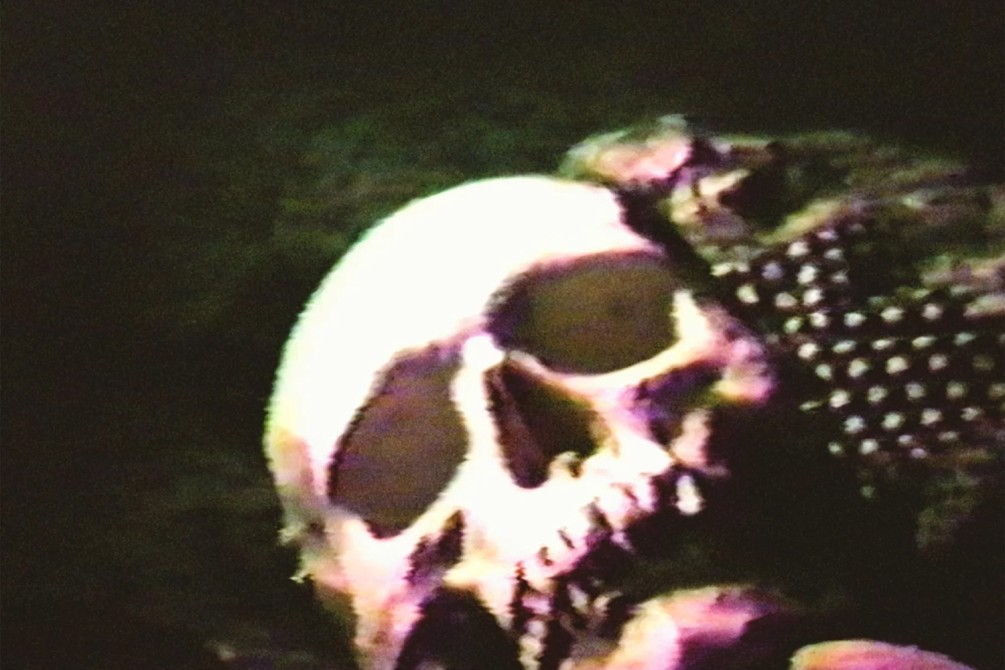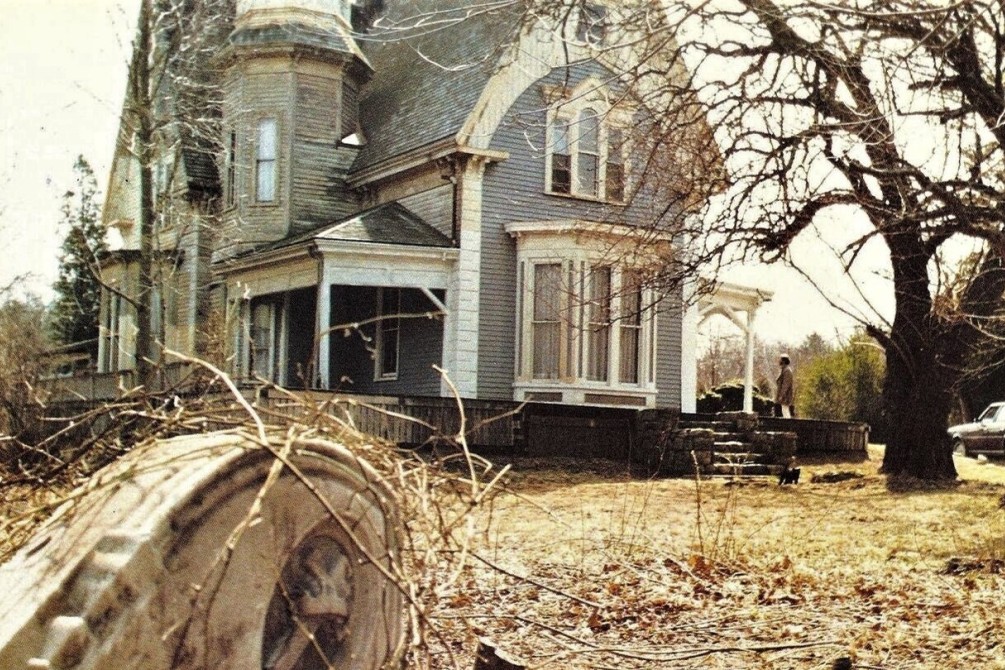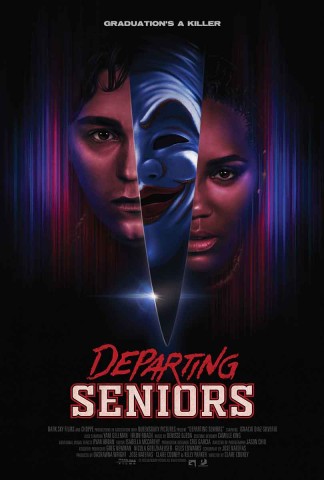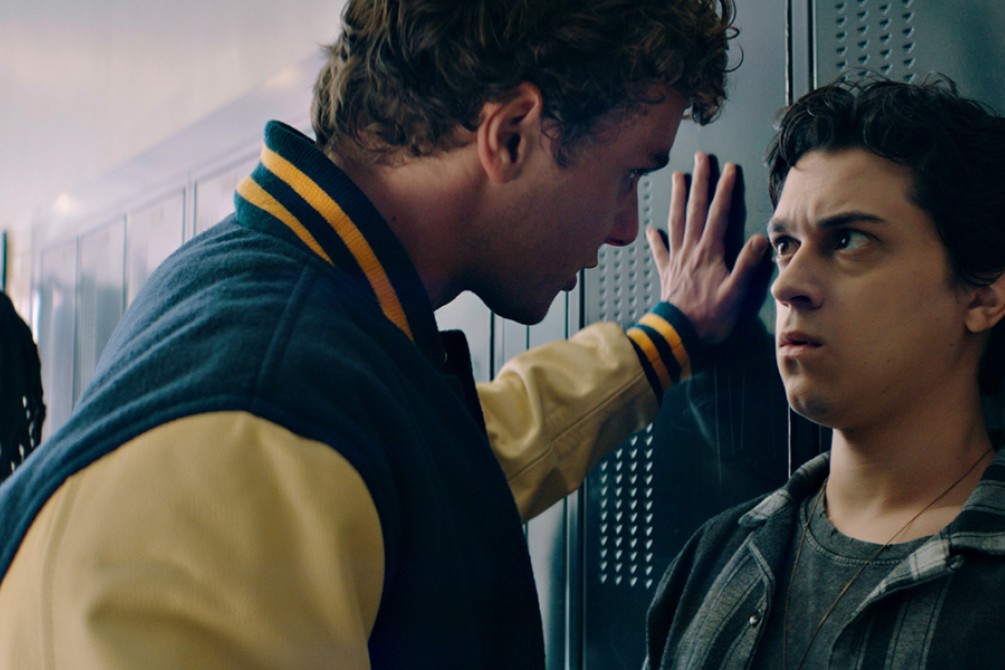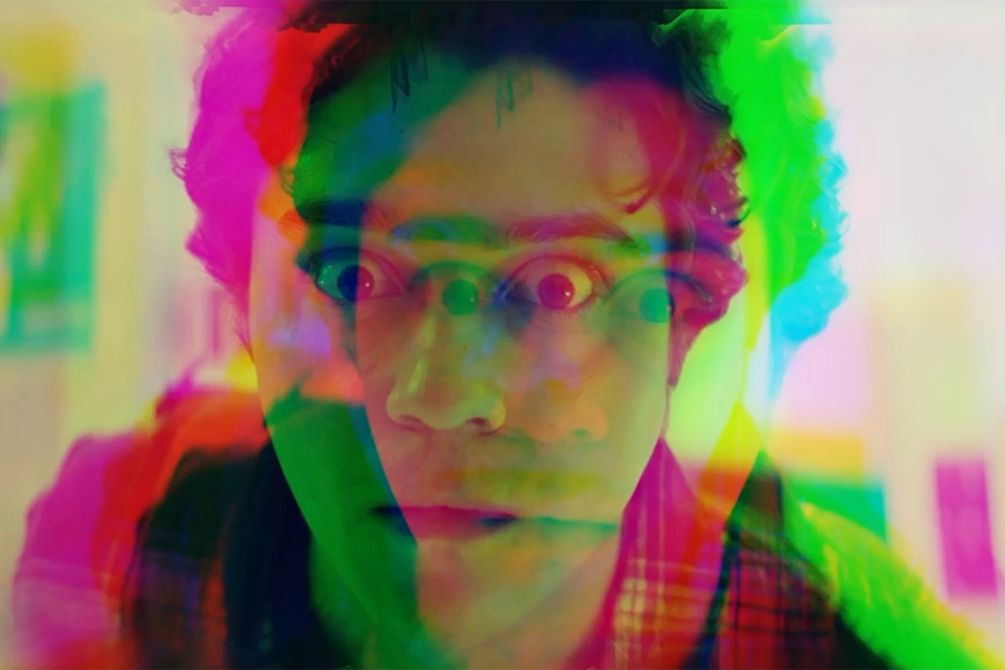
After an act of bullying sends kind but awkward high school senior Javier to the hospital, he begins having psychic visions that reveal the horrifying truth behind a rash of supposed suicides at his school. It is now up to him and his sarcastic best friend Bianca to unmask a serial killer who’s targeting his classmates before it’s too late.
**************************************
BACK TO SCHOOL: HORROR EDITION
An Exclusive Music Box Interview with DEPARTING SENIORS director Clare Cooney.
by Steve Prokopy
As an actor, Detroit-born Clare Cooney made a name for herself in Chicago after attending the School at Steppenwolf, which led to her getting work on stage and in several local indie film and television series productions, including a recurring role on “4400” and even a part in Steve McQueen’s WIDOWS. But in the mid-2010s, Cooney turned her attentions to writing and directing, and in 2017, she released her first short (in which she also starred), RUNNER, which extensively toured the festival circuit. Since then, she’s directed a handful of additional shorts, continued to act, and helmed her first feature, the high school-set horror-comedy DEPARTING SENIORS. Written by Jose Nateras, the film follows a senior named Javier (Ignacio Diaz-Silverio) who develops psychic powers after being bulled repeatedly, and he must use them to stop a serial killer targeting his classmates (but not him, apparently).
DEPARTING SENIORS had its world premiere in August 2023 at London’s FrightFest, and its U.S. debut last October at the Chicago International Film Festival at the Music Box Theatre, where it is currently playing weekend midnight shows. I had a chance to chat with Cooney just before the Chicago screening to discuss why making a horror film appealed to her, her horror inspirations, and how difficult the balancing act can be between horror and comedy.
DEPARTING SENIORS is playing at the Music Box Theatre on Friday, Feb. 9 at 11:30pm, and Saturday, Feb. 10 at Midnight.
Kicking off your feature directing career, you start with a horror movie, which a lot of filmmakers do. But I’m guessing you wanted to add a few twists and nuances of your own. Tell me about the process of landing on a horror film, and what you liked about this particular script.
Clare Cooney: I’m more so now, but when I got attached to this film, I was not a horror fan; I’m afraid of horror. I still haven’t seen some of the big ones, like HEREDITARY—I’m just too scared. I’ve always liked SCREAM and things like that. But when I read this, my friend Jose wrote it, I thought it was really charming. The relationships are what got me. I love relationship-based, character-driven stuff; I like to really flesh out a character. And the the relationship between Javier and Bianca [Ireon Roach] is so endearing, funny, lived-in, real, I felt like I could bring some of what I do well, which is direct characters. So I was excited about that. What also grabbed me was that there’s motive being the killer, as opposed to being a random psychopath who has no motive. I like exploring the psychology of human beings, so I felt like there was a way to keep the film grounded, have empathy for a lot of the characters, and also tell a fun, thrilling, terrifying story. I’m always going to make things complicated and want to have depth with things, but also I want to have fun with it. It was a really great challenge for me because I’ve never done anything this comedic or a slasher film. It was great to stretch those muscles and grow.
Do you think your lack of history with slasher films was a benefit because you didn’t know what you weren’t allowed to do and you didn’t lean into any of the familiar tropes?
Maybe. I started to watch a ton for research for this film.
What did you watch?
Okay, I’d already seen SCREAM, loved that. I’d seen CABIN IN THE WOODS, tons of fun. But I hadn’t seen JENNIFER’S BODY, loved that. HAPPY DEATH DAY. I had seen LET THE RIGHT ONE IN, which is a very different tone from mine, and eventually I want to make a movie like that.
Your opening reminded me of that film a great deal.
Yeah, thank you. That was very influential to that moment. MINORITY REPORT isn’t a horror film, but it was influential to the thriller-ness of it. I was also looking for films that had visions, so FINAL DESTINATION, FREAKY, THE DEAD ZONE, there are so many ones I dove into. A lot of them, I didn’t take anything directly from, but it helped my brain swim around in that genre. It was so much fun. The whole time, I was thinking about the tone of this; it’s a dark-comedy, but there have to be times when you really empathize with the characters and other times where you’re a little freaked out. But it being horrifying wasn’t as important as it being fun and you loving the characters. That was my priority.
Going back to what you said about the killer having a motive, which I wont’ give away, but was the idea that we might be on the side of the killer to a certain degree an interesting angle to explore?
In LET THE RIGHT ONE IN, we have so much empathy for the vampire, and the bullies are the evil ones, not the vampire. This film has a lot of bullying in it, and although there’s this killer who is absolutely the most horrifying one in the film, but the bullies are also pretty horrifying in their own way, and they’re also very human. Humans are dark creatures, we have dark instincts, and it’s our job to not listen to those shitty parts of ourselves.
And most bullies aren’t born like that, so it’s interesting to dig into those stories.
Yes, usually people who hurt others were hurt by someone else, or they have a deep insecurity. What makes me tick is thinking about why people behave like they do. I wanted to dive into that without it being too pretentious. I wanted to keep it fun.
The interesting thing about Javier’s bullying is that he doesn’t just take it. He yells at them, he fights back; I don’t remember ever seeing that in a film about high school bullying.
He’s a feisty character and knows who he is. I love that he’s a queer character who’s like “What’s up? I’m queer. Let’s move on.” He’s completely comfortable with who he is and is going to stick up for himself. The same with Bianca. They both know they’re a little different. Who gives a shit? They’re going to own this, and that was major because Jose made Javier a younger version of him. I think Jose felt he knew who he was, and he wanted to own who he was. There’s probably also a bit of how he wished he’d acted in high school too.
Tell me about how far back you and Jose go.
Jose and I met in Chicago, maybe eight years ago—not exactly sure when we met.
You both started out as actors, right?
Yes, and he’s always been a writer. He’s a playwright, he’s written some novels. Then he started getting into screenwriting. And we both found ourselves in Los Angeles, and I tell you, the Chicago-in-Los Angeles crowd is intense. We find each other and cling to each other. It’s like this slice of home, and it’s a tight-knit group there. So we started becoming closer in Los Angeles, and he had this script, and he knew that I had written, directed, and produced my own shorts and made them happen for not much money and was a scrappy filmmaker. We went out and talked about it, so we had lunch and I encouraged him to produce the film, which he had never done before. A few weeks later, he asked, “Could I interview you to potentially be a director on this film?” And the rest is history. It just goes to show that those connections you make in your early 20s can always come back to be the people you work with.
One of the things I enjoy about interviewing people with Chicago roots, especially in the theater, when they run into each other, they instantly come together. They all knew each other, worked with some of the same people; it’s weirdly incestuous.
Chicago is a very rough and raw place. You’re doing Chicago theater, so you’re up until 11pm or midnight, and then you’re going through the snow to the train to go home. It’s just a place where you bond with people, and it’s harder to do that in place like Los Angeles. I’m so proud and glad I came up here; this is where I honed my artistic skills; it’s my artistic home.
I’m assuming the characters were written as we see them in the film, in terms of the diverse characters. Was that something you were excited about bringing to life?
Sure, yeah. I talked to Jose and Dashawna [Wright, producer] early on, when I was talking about the project and what I would want to bring to it. And I also said, you have to make the call for yourselves about how comfortable you are having a white director. I can’t change that; all I know is that I can bring my empathy and storytelling skills and heart to this film. And Dashawna, who is the lead producer and a black woman, and Jose, who is a Mexican-American queer man, both said they felt like they were going to have a lot of leadership on this film that’s going to diverse. We want someone who has the right eye and really wants to take this story and run with it and will do so with empathy, even for cultures I’m not directly a part of. I believe you don’t have to be a part of a particular culture to have empathy for it, as long as you tell the story with respect and talk to the right people and are humble about it if you don’t know something. That’s the approach was. And I loved it because that’s what Chicago looks like; it’s a diverse city. The characters on the page—Bianca was written to be a woman of color, Javier was written was written to be a Latino queer man, and those may have been the only two races that were specified. So the rest we made diverse and representative of the city and what we want to see on screen.
Speaking of empathy, is there any part of your high school experience on the screen?
Sure. Honestly, the character I related to most is probably Brad [Sasha Kuznetsov]. That moment were he says, “I don’t know what I am,” I remember in my friend groups, people talking about the characters from “Friends,” saying “I’m a Monica, I’m a Rachel. I’m a Ross.” I remember turning to my mom and saying, “I don’t know which of them I am,” and my mom was like “That’s okay, because you aren’t one of them. You aren’t a stock character. You’re complex and also 16 or 17, still figuring out who you are.” I feel like I have a variety of selves, and for a long time, I struggled with which one of those selves is most like me. I have shy me, brave me, whatever. I think the older I get, the more I come to accept that’s they’re all a part of me. I also see Brad wanting to fit in and be with a group, and I really relate to that. I also relate to Ginny [Maisie Merlock], who wants to be the best at something, have the best grades. I’m very much a straight-A kind of girl. I relate to all of them in small ways.
I remember hearing Brad say “I don’t know who I am” and being surprised, because I think a lot of kids his age would simply deny deny deny. And I thought “There’s a little honesty.”
I love that part. Sasha, who plays Brad, did a great job with that because he’s so masculine and tough, and then there’s this vulnerability that comes out. I hope it’s getting better for high schoolers and becoming much more fluid with gender identity and with sexual orientation. For a lot of folks, that came up in a high school environment that wasn’t as open. I wonder what I’d be like if I was in high school now. Would I be a different person?
I read somewhere that you shot this over two or three weeks with strict COVID protocols, not ideal for a first feature. Did you experience in short films prepare you work more economically and faster? What did you apply from the short film world to this?
Absolutely, and you’re right, not ideal. I had this moment a few days before we started to film where I thought, “On the first day, am I going to get so nervous and overwhelmed that I feel out of my depth?” Because we had 16 days and not much money, so I didn’t have the time to feel self-conscious about making my first feature. I immediately was like, this is sink or swim, and I’m going to swim. So there was no hesitation; it was the same as being on a short, like making five shorts right in a row. I made a short film once that was 16 pages in one day, and there was one day on this film where we filmed 14 pages in one day. Adapting was the name of the game. If you’re rigid in your response to things or really dwell when things don’t work out, an indie film is going to crash and burn. We didn’t have any grace as far as time and money, so you have to roll with it and stay positive and come up with solutions, and that’s what making a short is too. I got a crash course in independent filmmaking through these shorts, and it was directly applicable to this film.
You mentioned the chemistry between Javier and Bianca. Did they have any time to hang out beforehand to get to know each other?
Not really. We didn’t cast Ignacio until a little more than a week prior because he had just come off a show called “Primo.” He basically sent his audition tape in from his trailer, so we got him last minute because I hadn’t found him yet. I know when I find the person, and we’d seen a lot of tapes, and no one was the right fit. He has to have chops comedically, dramatically; he has to have the right look and vibe, have that humor. He’s got an amazing face; he’s in every scene in the film. I’d known Ireon from a show we did on the CW, and she’d been in audition rooms in Chicago with me. I’d had her in the back of my mind for this part already for the role. She can act with anyone; she’s just so captivating and charismatic. I think they had a couple hours before they had to film together to chat, and it was lightning in a bottle. I also think that if you cast two deeply talented people who listen and play off each other, the chemistry will be there.
You could have told this story with the psychic powers, but you have a very specific visual style for those flash-forwards and flashbacks. Tell me about coming up with that.
We knew we wanted to do a zoom into the brain and zoom out of the brain. That was a concept I come up with with my director of photography Jason Chiu, who filmed my first short film RUNNER, and he’s just a fantastic Chciago DP. I wanted to do a really fast dolly movement, push in on the brain, on his eyes, and once we’re there, have the visual style shift entirely and be in this psychic, trippy visual thing where it feels like a dream state. When you’re dreaming, you come out of the dream wondering what happened, like it’s hard to fully remember. I wanted to get that, where you’re getting the story but you’re not getting the full thing, and it feels like you’re grasping onto the information you can get. I mentioned, MINORITY REPORT was really inspiring with the eyes being the main thing. You’re zooming in on his eyes and seeing the eyes of the person he’s in. We found an interesting visual style by filming closeups of all of their eyes on one of the last days of shooting, and our gaffer Jonathan Lopez through on a certain kind of lighting effect, this technicolor thing, and we all thought it was gorgeous and interesting. That quality blended into the way we cut the film, and I cut it with a woman named Isabella J McCarthy, who takes fun risks with her style. All in all, it was a very collaborative process, and once we found it, we thought it was really fun and different, like frenetic and spooky.
Tonally, horror-comedies are the hardest to get right because you want it to be scary, but you also want people to know it’s cool to laugh at times. So how did you find that balance?
Oh god. I still think I should tweak certain parts. I’m always hard on myself. But the casting is a huge part of it. We cast people who have a dry quality to their delivery, like an understated, throwaway sense of humor. That humor side of it was clear because of that. There are a couple moments when we allow it to get goofy, but I like to live in reality, so I wanted it to be be SCREAM meets “Euphoria” in terms of it tone. It’s definitely scary at times, there’s tension there, but it’s not going to horrify you; you aren’t going to be disturbed. It’s just fun to have that thrill about what’s going to be around the next corner. I was worried about the tone until I saw it with an audience. I knew it worked for me, but I didn’t know if it worked for other people. And thank god at FrightFest, we had a sold out house, and people were laughing, jumping, and I was so happy it worked. You just don’t know until you have a crowd.
As we discussed, you have these strong Chicago roots. What do you think is the most Chicago thing about you?
About me? I think I’m crazy hard-working. Chicagoans are crazy hard-working. It’s a working-man’s city, and there’s also a pride in authenticity and no bullshit. That’s how I am. I really try to be my authentic self and try to stand for what I say or do. That’s a very humble, Chicago value. I grew up in the Midwest. When I moved to Los Angeles, someone was like “Ugh, she so humble, so Midwestern.” I used to think I was cocky for a Chicago person, so it’s funny in-between. In terms of the movie, we filmed in a bunch of different Chicago places that people will recognize, and that makes me so happy. And I’m a late-night girl, I like to have a time and be social, and Chicago is a very social town—people want to have a drink and get to know you.
How important is it for you have have your U.S. premiere in Chicago at the Music Box, where you’ve had your work play before?
It’s huge. I’ve always wanted to play at this film festival, sincerely. I went to this festival when I was 22 or 23, and we were invited to an opening-night function. I put on a black dress and did my first step and repeat. I was so thrilled to be an artist in Chicago. If you told me then that my directorial debut would be at opening night at the Music Box, I would have said, “Oh my god, I made it!” It’s a real thrill.
Thanks for chatting. Best of luck with this.
Thank you so much.
Steve Prokopy is the chief film critic for the Chicago-based arts outlet Third Coast Review (www.ThirdCoastReview.com), a co-host of the Movie Madness podcast, and the Public Relations Manager for the Music Box Theatre.
Recommended Films
